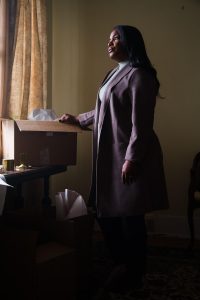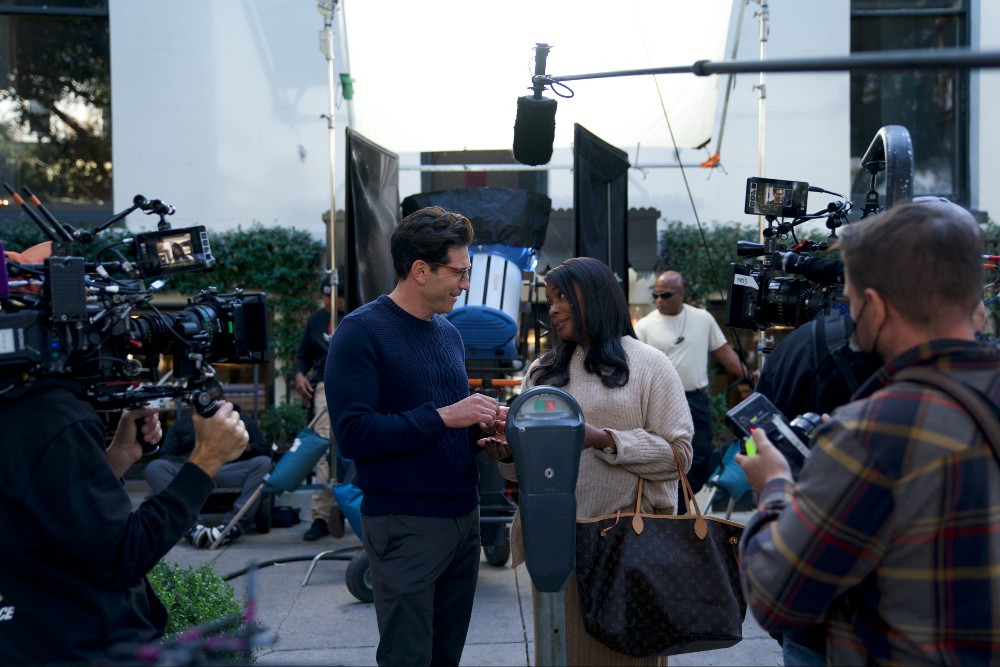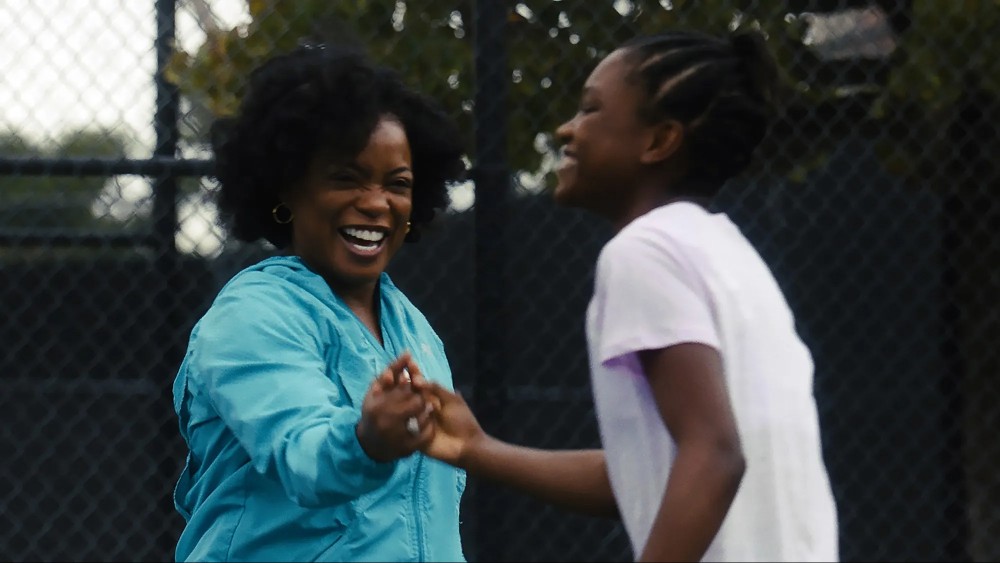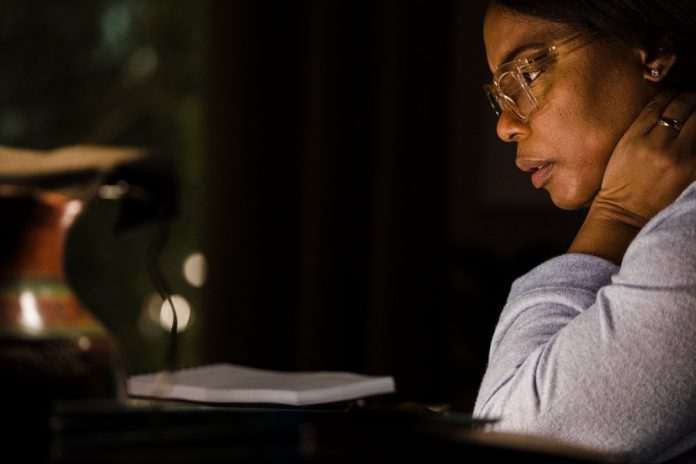It’s been a great few years for actress Aunjanue Ellis-Taylor, a two-time Emmy nominee for When They See Us and Lovecraft Country who earned her first Oscar nomination in 2021 for playing Brandy Williams in King Richard. In 2023 alone, she appeared on television in 61st Street and Justified: City Primeval, and had a small role as Mama in the movie musical The Color Purple. Her biggest role to date: anchoring the weighty drama Origin from acclaimed director Ava DuVernay.
Above the Line spoke with Ellis-Taylor about the chance to reunite with her When They See Us director DuVernay and how she traces the real-world impact of that limited series. She explained her relationship with Isabel Wilkerson before and after portraying her, and how the experience of filming this comprehensive film affected her.
She also looked back at some of her breakthrough roles, including in the Oscar-winning 2004 biopic Ray opposite Jamie Foxx, and expressed who she’d like to worth with in the near future. She also revealed she hasn’t yet seen Origin as a complete motion picture, and that she typically doesn’t watch her own work – a rule she might eventually break in this case.

Above The Line: What did you know about Isabel Wilkerson before coming onto this film?
Aunjanue Ellis-Taylor: I knew her by reputation. I knew that she had won a Pulitzer Prize at The New York Times. She won another Pulitzer Prize for The Warmth of Other Suns. So she was just a Pulitzer Prize magnet, right? I had heard her conversations about Caste when it came out in in 2020. I had purchased the book, but I had not read the book. But from her discussions, I knew that she was offering something and was writing us into a new language about how we talk about social divisions in this country. I just thought it was just so fascinating. But really, my familiarity with her work and love of her work was in Warmth of Other Suns. And after I got cast in Caste – that’s inevitable, I’m going to say that, I don’t know how else to get around that – I read the book and I was transformed by it.
ATL: In the film, people react strongly to the idea of comparing a few things that don’t seem like they can really be compared. How did that strike you when you first read it?
Ellis-Taylor: It’s one of those things, because it’s not something that we are familiar with. We are so used to using race as the word that we use to understand us and to understand social divisions and understand oppression, that we’ve become lazy. Race essentially now is an abstraction. When I was reading it, when you’re so used to something, it takes a muscle that you’re not used to. I definitely had to read things over and over and over so I could grasp it, and especially because I was going to have to be believable seeing it on screen. That was work. It was work. Understanding it for me personally, it was work, being able to convey that and portray it believably on screen. But what was so interesting for me personally, is that she was giving me language for things that I have experienced but didn’t know what to call it, didn’t know what to say. Particularly with how she builds her argument for caste with these eight pillars of caste. One of those things being how terrorism is used as a means of control. Those expressions of terrorism for me have, personally, been in Mississippi, the Confederate flag, the statues that we have been sold are just, “Hey, geography, we’re just erecting these statues because we are honoring our fallen Confederate soldiers.” But in fact, they were erected to be used as intimidation against newly emancipated slaves. So this is my life. I live in McComb, Mississippi still, and I drive by these statues every day. I drive by these flags every day. For her to give me that understanding, to give me that language, is invaluable.
ATL: How do you think this film would play in Mississippi?
Ellis-Taylor: I can’t wait, yo! I cannot wait. I didn’t think it was going to have a run in Mississippi, but my sister saw a poster in Hattiesburg, so I can’t wait.
ATL: This wasn’t your first time working with Ava. What was it like coming back to work with her again?
Ellis-Taylor: I wanted to work with her again. I wanted to continue the work that we started on When They See Us. I say this about her: she’s a director of consequence. When They See Us held people accountable in ways that when the actual trial happened, that didn’t happen. It took decades for that correction to happen, not just in terms of their being exonerated legally, but how the world sees them, because you can be found not guilty and people still think you’re guilty of something. That piece acted as a way to exonerate them on a personal level. We see the results of that with Yusef Salaam, whose mother I played, who is about to be a councilman for the city of New York. I trace his campaign directly back to the success of When They See Us. I wanted to continue the work that I felt that I had started with her on that.
ATL: Was it important for you to get to meet Isabel and mimic how she is in real life?
Ellis-Taylor: I didn’t get to meet her. When I became a part of the project, they had decided – her and Ava – to let Ava do her thing. When I came in, I respected that. So I didn’t meet her. But I don’t do mimicry. I’m not Jim Carrey. Hopefully what resonates from what I do is the spirit of this woman, the conviction that she had. That’s hopefully what I brought.

ATL: There are also a few films within this film, and some of them you’re not even a part of; they’re the flashbacks to the ideas of what’s happening. For you, there’s a love story and the story of a woman and her mother. Did you feel like those were compartmentalized into different projects within the project?
Ellis-Taylor: No, it felt the same. I felt like there was a through-line. I felt that she was trying to solve this problem, and while in the midst of solving this problem, she was experiencing this incredible loss and an incredible grief. Loss does not care that you’re in the middle of writing a book that would change the world. It just does not care. Sickness does not care. It does not care. It visits itself upon you no matter what you are doing. You want to be like, “Yo, wait a minute, I’m writing the book of the century, and it does not give an F.” It felt very alive to me, that felt very believable. It’s just inconvenient. Grief is inconvenient. It felt right that she was trying to write this book, writing these radical ideas while at the same time trying to hold her mind, hold her heart together. And I just think that’s a remarkable struggle to witness.
ATL: When you saw the film as a whole for the first time, was it surprising because you hadn’t seen those other segments?
Ellis-Taylor: Well, I haven’t seen the film in totality. That scene that was done in the square in Germany, my hotel room overlooked that square. They shot that over the course of a night, so I would be waking up, going to the bathroom, and I’d watch them outside, still freezing in the cold, doing that scene. It didn’t feel disparate. It felt like it was another part of me living somewhere else or expressing my ideas somewhere else. It was incredible. The great thing about Ava DuVernay is that she wants her actors to feel what is happening in the moment. There was no CGI out there, there were really all of those actors, hundreds of them, in that square in the middle of the night, cold as F, burning those books. It was real. It was not imagined. It was not computer-generated. It was alive. I just think that’s so impressive about her.
ATL: Have you heard interesting things from people who have seen the film in Toronto or other places since then?
Ellis-Taylor: I’m trying very hard not to hear anything. Yeah, I don’t want to know. It’s just one of those films that could be something folks talk about over dinner tables and in classrooms. I hope that happens. Whether I’m a part of it or not, I hope that happens.
ATL: Do you have plans to see the complete film at some point?
Ellis-Taylor: At some point. One of these days, one of these days.
ATL: Are you holding off for the right opportunity?
Ellis-Taylor: I’m holding off. When I can be more objective about it, I might watch it.
ATL: Do you typically watch your own work?
Ellis-Taylor: Not typically, no. But I do feel, with this, because of what it’s trying to do as a film, I think I need to watch it at some point just so I can be articulate when somebody asks me a question about it. So I think at some point I will see it.

ATL: We’re just a few years from your Oscar nomination for King Richard. Do you feel like your career has had a shift since that point?
Ellis-Taylor: Well, after that, I definitely worked a lot. I got a lot of job offers. It just was an opportunity for me to work with more directors that I have a lot of faith in and are doing some really interesting, radical stuff on film. I worked with RaMell Ross on The Nickel Boys, another adaptation. He’s a really unique voice. Being able to work with directors like that, I think, was definitely a result of that nomination, and I hope it keeps coming.
ATL: When we’re talking about radical and interesting and race-related, I think Lovecraft Country definitely deserves a few minutes of conversation. That’s such a fascinating show unlike anything else. What was it like to be a part of that? I gather that’s a CGI-assisted show.
Ellis-Taylor: Oh yeah, it was. There was some CGI on that. I was in harnesses pretending I was in space, so yeah, there was some CGI on that. As you said, it was a radical piece of work. It was a radical experience, working with these really incredible actors that I’ve worked with: Jonathan Majors, Michael K. Williams, Jurnee Smollett, I could go on and on. What I love about it is that it was only on for one season, but people are always asking me about it. I love that it’s still living on in people’s imaginations.
ATL: Looking back at your credits, there are a lot of shows that didn’t last very long, maybe not even a full season. Do you have any performances from series or films that you feel like no one ever asks you about but live on really strongly in your memory?
Ellis-Taylor: Listen, most of what I’ve done, nobody ever saw, you know what I mean? People didn’t really start seeing my work, honestly, until Ray — Jamie Foxx’s Oscar win. Pretty much everything that I had done up to that point was a lot of that. A couple seasons, a season, two episodes. It was mostly that.
ATL: What do you put of yourself into a guest spot on a show that people don’t end up seeing? Do you still feel you’re getting into the character in the same way?
Ellis-Taylor: Yeah, I take nothing for granted. I take nothing for granted, now. There was a time when I did not. When I first started acting, I didn’t realize the lottery win that is getting a job. I did not understand that. I took for granted that, “O, I’ll be successful. These things will happen to me.” But I was a little fish in a big pond. I was a little fish in an ocean of people who knew that they wanted to be actors when they were three years old. I didn’t have that vision for myself at all. I was a latecomer, and when I got to be, I would say, “a grown woman,” when I turned forty years old, a little after that, I said, “Okay, I keep getting hired, so I need to do something with this. I need to take this seriously.” My family has started depending on this income that I had, so I needed to continue it. I needed to continue working because I had people in my life that I had to take care of and it just added another layer of importance and significance and urgency to what I was doing. So yeah, it was a lot. There’s a whole big basket of stuff that I did not take seriously, that I took for granted. But that basket has been discarded. It’s over. It became something else about ten to twelve years ago. And I want to believe that I did my best back then, but I was a kid and I did not necessarily do my best. I took it for granted.
ATL: Has the industry changed in that time?
Ellis-Taylor: Yeah, I think so. That’s a loaded question, because it has changed in some ways, and in other ways, it has not changed. Sometimes, I feel like it reflects things that it purports itself to stand up against.
ATL: You’ve done a lot of film and a lot of TV. Do you have a preference between the two?
Ellis-Taylor: I like doing films because I like the schedule of a film. To play a character for an extended period of time is another kind of muscle. But if you’re doing something that you love, it doesn’t matter.
ATL: Is there anything that you haven’t tried yet that you’d really like to do, whether it’s a role or a genre or a filmmaker you’d like to work with?
Ellis-Taylor: Ooh. There’s a filmmaker, her name is Raven Jackson. She had a film that came out this fall, All Dirt Roads Taste of Salt. I just love her work. You may be familiar with this filmmaker named A.V. Rockwell, who did A Thousand and One with Teyana Taylor, who delivers one of the best performances ever. I want to work with her. It’s a lot of women actors who I want to work with. And I want to do my own stuff. I want to do my own writing. There’s this writer I know named Aunjanue Ellis, whose writing I want to do.
ATL: What would you like to write about?
Ellis-Taylor: I’ve written a couple of things. I would say my passion is this story about a sharecropper, this radical woman who is a fighter for reproductive rights in Mississippi. The sharecropper, her name is Fannie Lou Hamer. So yeah, that’s the dream.
Origin will be released into select cities by NEON on Jan. 19, and you can also read Abe Friedtanzer‘s review here.



